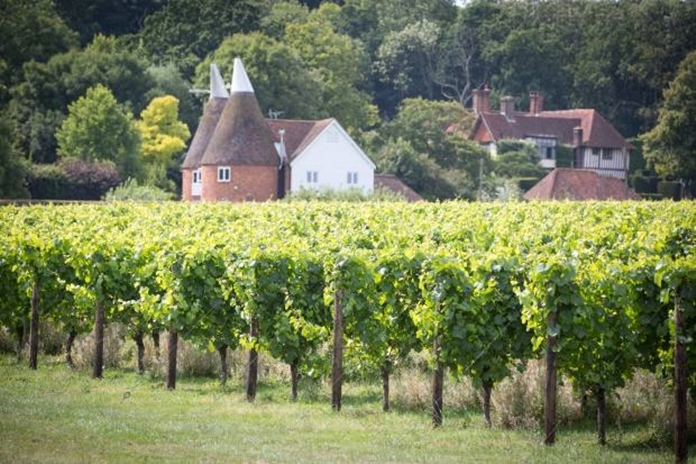
In 2002, the British Broadcasting Corporation organized a poll to find out who were considered the greatest British people who ever lived. You can probably guess a few of them yourself. It turned out that William Blake, the slightly eccentric English poet and painter was placed at Number 38. If these things interest you, I shall leave you to find out who the others were but sadly, I am not among them.
William Blake was unrecognized during his lifetime but he’s now considered a key figure in Romantic art and poetry. It is he who gave us the expression “England’s green and pleasant land” which first appeared in the rather surreal and supposedly prophetic poem of 1804 entitled Jerusalem. It was written when Blake was living in his cottage in Felpham, a small village near the Sussex town of Bognor Regis. The village lies in the heart of England’s wine country.
Wine making was introduced to Britain by the Romans, who occupied the country for well over three hundred years. The Domesday Book of 1085 lists over 40 vineyards in England and by the time Henry VIII was crowned at the turn of the 16th century there were 139 vineyards in the country. Today there are more than 500 in England and also a couple of dozen in Wales.
For a variety of economic and political reasons, English wine had entered a dark age during the 19th century and by the First World War, wine production had ceased completely. Although attempts were made to kick-start the wine industry in the 1930s, it wasn’t until the 1960s that it started to get back on its feet.
In subsequent years things improved, largely due to increased expertise, climate change and market demands. Today, many parts of southern Britain are dry and warm enough to grow high quality grapes and the soil seems to suit them too. It’s in the interest of farmers as well, because grapes produce far more income per acre than traditional English crops such as wheat.
Generally, cool-climate grapes are best suited to England, including Seyval Blanc, Reichensteiner and the cross-breed variety Müller-Thurgau. Bacchus is a German hybrid white grape created in the 1930s and it’s the grape of choice for many English wine-makers.
Initially, only white grapes could be grown there, but the warmer climate is allowing the production of red wines too. The red grapes Pinot Noir, Gamay and Dornfelder are now appearing in English vineyards.
The counties along the southern coast – Kent, Sussex and Hampshire – are the home of some of England’s best-known vineyards. Kent currently has the largest area under vine, its largest producers being Gusbourne Estate and Chapel Down.
England is also producing world-class sparkling wines from traditional Champagne grapes such as Chardonnay, Pinot Noir and Pinot Meunier.
Award-winning sommelier Marc Almert writes, “British sparkling wines are currently on everyone’s lips in the international wine world. On average, the climate in southern England today is like that of Champagne twenty years ago. The soils of the vineyards around Sussex and Kent also have high lime content, similar to that in Champagne. No wonder that England is currently one of the most dynamic sparkling wine regions in the world.”
The French Champagne companies must have been eyeing this English success with interest, to say the least. Three years ago, the distinguished French Champagne house Taittinger planted its first vines in 170 acres of farmland near Selling Court Farm in Kent. Some of the locals may have wondered whether this was a portent of a second Norman invasion.
Many English wine companies have been tremendously successful. One of them is Nyetimber Wines. Thirty years ago, Stuart and Sandy Moss planted a vineyard in the district of Nyetimber in West Sussex, not far from where William Blake wrote his famous poem. Their first wines were released in 1997 and promptly won a Gold Medal at the International Wine and Spirit Competition. The company has gone from strength to strength and a few weeks ago announced a major planting of over 100 acres near the village of Thurnham in Kent. Two hundred thousand Pinot Noir and Chardonnay vines have already been planted.
So which are the best English wines to look out for? Well, I am afraid the bad news is that you’ll probably have to go there to buy them. As far as I am aware, there are no UK wines yet available in Thailand. If however, you can persuade someone to bring you a sample when all the current problems subside, there are several excellent outlets in the UK all of which offer online service.
Majestic Wine is a well-established company that offers an excellent selection of English wine. Other important outlets are Grape Britannia, Elizabeth Rose English Wines, Hawkins Brothers, The British Wine Cellar, The English Wine Collection and Hennings Wine. These companies together offer an incredible selection of fine wine. If you are planning a future trip there, be sure to seek out some of the superb wines that the UK has to offer.
 |
 |
 |





